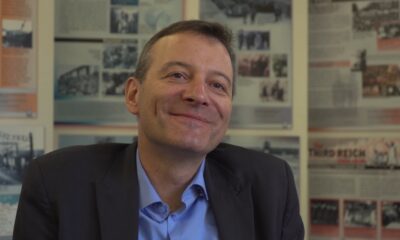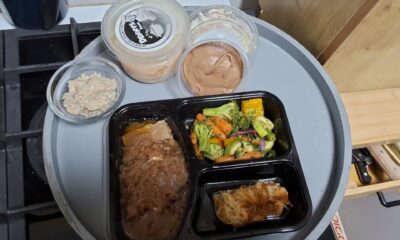
World

Speak out and combat lies, UN urges on Holocaust anniversary
Human rights across the globe have been threatened by people with ill intentions. We must recognise this, and counteract it appropriately, António Guterres, the United Nations (UN) secretary-general, and Masimba Tafirenyika, the director of the UN information centre in Pretoria, told the Johannesburg Holocaust & Genocide Centre’s (JHGC’s) International Holocaust Remembrance Day commemoration last week.
The memorial day, held on 27 January, was the 78th anniversary of the liberation of the German Nazi concentration and extermination camp, Auschwitz, by Soviet soldiers of the 60th Army of the First Ukrainian Front in 1945.
It’s vital that we’re more outspoken than ever, Guterres said, in the face of “growing economic contempt, political instability, escalating white supremacy, terrorism, surging hate, and religious bigotry”.
“We must never forget and not allow others to forget, distort, or deny the Holocaust,” he said.
Tafirenyika said the outreach programme of the UN’s commemoratives activities this year was “framed around what home and belonging meant to the Holocaust survivors in the immediate post-war years, and how the meaning of home and belonging has been challenged by the perpetrators of the Holocaust”.
“The theme this year is ‘Home and Belong’. It’s a fitting recognition of one of the communication priorities of the UN – its fight against misinformation, disinformation, and hate speech,” Tafirenyika said.
“This year, we’ll zoom in on hate speech, misinformation, and disinformation, and the UN will advocate for right of access to reliable information sources. We will urge technology platforms, especially social media, to review business practices that allow them to profit from misinformation and disinformation as well as hateful content.”
Tali Nates, the founder and director of the JHGC, said that though memorial days are vitally important, “for us at the centre, our activities go beyond one day of commemoration. We’re involved in commemoration activities 365 days of the year as hate speech, antisemitism, Holocaust distortion and denial, racism, and xenophobia are sadly still with us”.
Paul Salmons, lead curator of the Seeing Auschwitz exhibition on show at the JHGC and one of the world’s leading experts on the Holocaust, said, “Our memory work is an attempt to restore [the victims of the Holocaust] to us in some way, to give them some dignity, to resist the efforts of the murderers to erase them completely from this earth. One of the ways we can do that is through historical research and commemoration events such as today.”
“Today, the whole world marks the memory of the Jewish people who perished during the Holocaust,” said Eli Belotsercovsky, the Israeli ambassador to South Africa. “This day is a memorial for the great loss of those terrible times, but it’s also a memorial for those who risked their lives by saving Jewish families, and for the Jewish fighters who displayed a tremendous degree of heroism by fighting the Nazi extermination machine.
“The Holocaust was a massive murder machine on an unprecedented scale, but also beforehand, and perhaps surprisingly afterwards, we saw more cases of genocide. Of course, Rwanda is a vivid and clear example, but unfortunately not the only one. The lesson we learn from this sad history is that humanity, unfortunately, doesn’t learn anything from history. The atrocities of the Holocaust should have prevented us from repeating it, but this hasn’t happened and the murder of human beings solely because of their ethnic origins unfortunately occurs time and time again. As the Jewish people, as Israelis, we can learn one very disturbing lesson from history: we’re on our own.”
Andreas Peschke, the German ambassador to South Africa, said we see many people, but often don’t recognise them or take time to appreciate their human side and personal backgrounds. “January 27 is the day on which we are all called to do just that. We’re called to let the survivors of the Shoah tell us what terrible traces the national and socialist racial madness left behind. We’re called to listen to them, hear them, and see them.”
The German embassy in South Africa is proud to have a good relationship with the JHGC, Peschke said. “We’re committed to supporting the centre with further projects and plans in the future because truthfulness and standing up against denial, trivialisation, and/or falsification of the Holocaust is a central concern of the federal government of Germany and should be a central concern for all of us.
“In Germany today, there’s broad political consensus that remembering the Holocaust and dealing with it remains an ongoing task for politics as well as for society in all its facets. The federal government is therefore promoting memorial sites that often exist in the authentic locations of the crimes.”
During the commemoration, seven candles were lit by Holocaust survivors who came to live in South Africa and build a family here.
Dutch-born Irene Fainman was one of them. Fainman survived two concentration camps before being taken by the white bus rescue mission to Sweden in April 1945.
Another was Polish-born Irene Klass, who survived the Warsaw Ghetto before living under a Christian identity in Warsaw and suffering short imprisonments in an internment camp.
Lia Stermer, born in the Soviet Union (in an area that’s Ukraine today), survived labour camps.
Born in what was then Ukraine, Adi Wander, who didn’t speak about his experience of the Holocaust until recently, was incarcerated in two ghettos and a camp with his parents. They were liberated from Chernivtsi in Ukraine at the end of the war.
Belgium-born Helene Sieff survived in hiding, moving from place to place as a little girl until March 1943, when she moved to the home of a widow who treated her as one of her children.
Polish-born Helen Lieman survived by escaping German-occupied Poland before being deported by the Soviets to Siberia and then moving to Kazakhstan.
French-born Reverend Joseph Matzner survived by being hidden in different convents as a baby.
Photo Credit M Jacob Mawela











yitzchak
February 2, 2023 at 1:38 pm
Any official South African Government
representatives?